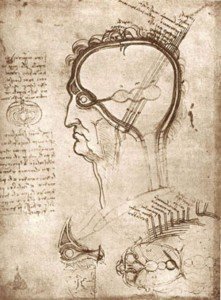Published April 8, 2013
President Obama rolled out an ambitious new scientific research initiative to study the brain last week that he hopes will bring major scientific discoveries for human health and understanding.
 In his remarks on the BRAIN initiative, the president said that the funding will give "scientists the tools they need to get a dynamic picture of the brain in action and better understand how we think and how we learn and how we remember."
The president announced that his budget for 2014 will include $100 million for the project called BRAIN: Brain Research through Advancing Innovative Neurotechnologies (BRAIN).
Congress will make the ultimate decision on whether the president’s plan makes it into the final budget, but already the initiative is being compared to the Humane Genome Project, which finished decoding the genetic pattern that makes all humans unique in 2003.
While the brain mapping project has also been compared to President John F. Kennedy’s 1961 challenge to land a human on the moon, brain researcher Eric Kandel says this will be harder.
“Going to the moon - I don't mean to in any way minimize it - was in part an engineering project. This [brain research] is going into the unknown. This is like Columbus discovering America, if you will," Dr. Kendel, who won the Nobel Prize in 2000 for his research on the brain, told CBS News.
President Obama said this is the right time to take on this challenge. "As humans we can identify galaxies light-years away. We can study particles smaller than an atom, but we still haven't unlocked the mystery of the three pounds of matter that sits between our ears."
In his remarks on the BRAIN initiative, the president said that the funding will give "scientists the tools they need to get a dynamic picture of the brain in action and better understand how we think and how we learn and how we remember."
The president announced that his budget for 2014 will include $100 million for the project called BRAIN: Brain Research through Advancing Innovative Neurotechnologies (BRAIN).
Congress will make the ultimate decision on whether the president’s plan makes it into the final budget, but already the initiative is being compared to the Humane Genome Project, which finished decoding the genetic pattern that makes all humans unique in 2003.
While the brain mapping project has also been compared to President John F. Kennedy’s 1961 challenge to land a human on the moon, brain researcher Eric Kandel says this will be harder.
“Going to the moon - I don't mean to in any way minimize it - was in part an engineering project. This [brain research] is going into the unknown. This is like Columbus discovering America, if you will," Dr. Kendel, who won the Nobel Prize in 2000 for his research on the brain, told CBS News.
President Obama said this is the right time to take on this challenge. "As humans we can identify galaxies light-years away. We can study particles smaller than an atom, but we still haven't unlocked the mystery of the three pounds of matter that sits between our ears."
 Humans have tried to study the brain for centuries. This sketch shows an early attempt by Leonardo Da Vinci from around the year 1490.
Neuroscientists hope BRAIN will allow them to map the connections between individual neurons and large circuits of neurons to unlock the secrets behind Alzheimer’s, Autism, strokes, traumatic brain injuries (TBIs), and some psychiatric disorders.
Director of the National Institutes of Health (NIH) Dr. Francis Collins, who joined the president in introducing BRAIN, predicted that advances in neuroscience could lead to the development of better computers. “Let's be clear,” Collins said on the NewsHour, “The brain is the most complicated organ in the universe. We have learned a lot about other human organs. We know how the heart pumps and how the kidney does what it does...we have read the letters of the human genome. But the brain has 100 billion neurons. Each one of those has about 10,000 connections. So that means there's something like 1,000 trillion connections inside your brain...right now."
Humans have tried to study the brain for centuries. This sketch shows an early attempt by Leonardo Da Vinci from around the year 1490.
Neuroscientists hope BRAIN will allow them to map the connections between individual neurons and large circuits of neurons to unlock the secrets behind Alzheimer’s, Autism, strokes, traumatic brain injuries (TBIs), and some psychiatric disorders.
Director of the National Institutes of Health (NIH) Dr. Francis Collins, who joined the president in introducing BRAIN, predicted that advances in neuroscience could lead to the development of better computers. “Let's be clear,” Collins said on the NewsHour, “The brain is the most complicated organ in the universe. We have learned a lot about other human organs. We know how the heart pumps and how the kidney does what it does...we have read the letters of the human genome. But the brain has 100 billion neurons. Each one of those has about 10,000 connections. So that means there's something like 1,000 trillion connections inside your brain...right now."

Mapping the brain could ease human suffering
Chief of the human nervous system, the brain is made up of hundreds of cells called neurons. Unlike many other cells in the human body, neurons do not reproduce, which makes it difficult to reverse damage when they die or are impaired. Damaged neurons, either from genetic or environmental factors, can lead to Alzheimer’s disease, for example. Alzheimer's is a loss of brain function that causes memory loss and confusion, mostly in people over 60. It currently affects 5 million Americans, and there is no prevention or cure.

